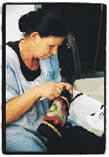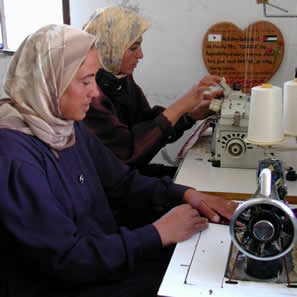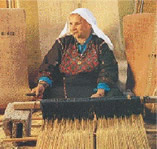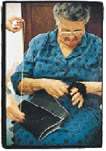Sunbula sells craft produced by groups all over Palestine. On this page we have collected information of a few.

UNR - The Sulafa UNRWA Embroidery Project (UNR) aims to provide income for women and to ensure that the traditional art form of embroidery is kept alive. All Sulafa's embroidery patterns are traditional. The most common color used is deep red. Hundreds of women served by centers in nine refugee camps in the Gaza Strip are given work by the embroidery project.
SID - Lakiya (SID) Negev Bedouin rugs are woven outdoors on ground looms. The yarn is handspun from the wool of local desert sheep. The traditional warpface weave is tight and durable, making the rugs ideal for areas of heavy use. Traditionally Bedouin women wove tents, rugs, camel bags, belts, lafehs (a long belt to tie the hair), grain sacks and other household products. By increasing demand for their weaving, the cooperative aims to revive and preserve a craft central to Bedouin social and cultural heritage. Lakiya is a project of Sidreh (a charitable non-profit organization).
WCCS - The Women's Child Care Society (WCCS) of Beit Jala was organized in 1944 by local women. In 1948 two first aid centers and lunch programmes were started to help the casualties of the war and the refugees pouring into Bethlehem. This is the only group that has preserved the tahriri (couching) stitch developed in the area of Bethlehem and the neighbouring villages of Beit Jala and Beit Sahour.
PAS - The Pastoral Society, Ramallah (PAS) was formed in 1988 at the outbreak of the first intifadah (uprising) to assist local families. In the course of the intifadah women found themselves having to try to fill the wage-earning roles of their husbands and sons. The Greek Catholic (Melkite) Church Center provides support and facilities where women obtain embroidery cloth and thread which they then work at home.
IDN - The Idna Ladies Association (IDN) has formed a self-help income generation project for women in the village. The project allows a number of women to improve their family income, and puts the women in touch with a larger social group.
KAL - Kalandia Camp Cooperative (KAL) was the first cooperative to be founded in a refugee camp in the West Bank (1958). Kalandia has kindergarten, sewing and embroidery projects involving more than 650 women.
ASD - Founded in 1992, Atfaluna Society for Deaf Children (ASD) is the only institution in Gaza devoted to educating the deaf. Its services include audiology, a school for deaf children, the development of curricula for the deaf, and a family outreach programme. The Deaf Women's Group and the Vocational Training Carpentry Programme are among the organizations through which Atfaluna employs deaf Palestinians.
BAWU - The Bethlehem Arab Women's Union (BAWU) was founded in 1947 as a first aid center. Today, among other projects, the Union has an arts and crafts center, a food service and a new art museum. Traditional patterns of embroidery, especially from the Bethlehem area, are copied from old designs.
YWCA - The YWCA project began in 1953 in the Aqbet Jaber refugee camp in Jericho. Created to help girls gain economic independence, the project started a kindergarten and also taught dressmaking, home economics and weaving. With population movement away from Jericho after the 1967 war, only the preschool and doll-making classes continued. Larger YWCA projects now exist in the Jalazone refugee camp outside of Ramallah.
SURIF - The Mennonite Central Committee began a needlework programme in the village of Surif in 1950. Its purpose was to supplement the income of refugees and villagers suffering as a result of the 1948 war. In 1979 the women of Surif took charge of their cooperative. Today more than 400 women from Surif and surrounding villages are members of the embroidery project.
Oasis - Oasis ia a paper recycling and greeting card production workshop in the Bethlehem area. The workshop provides an opportunity for adults with mental disabilities to work meaningfully and productively






